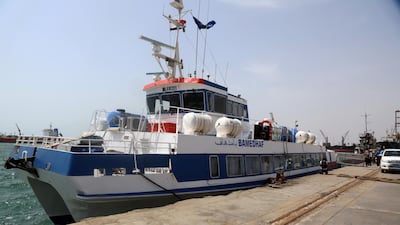Today marked a watershed moment in the Yemeni conflict; a day the Saudi-led coalition has sought to avoid but had become impossible to delay for the sake of the Yemeni people.
No stone has been left unturned in trying to reach a peaceful conclusion and end the suffering of a country under siege. Concerted efforts by the United Nations and the coalition – which includes the UAE – to end the war with dialogue and diplomacy have failed.
They have been met with repeat acts of aggression from the Iran-backed Houthi rebels and a stranglehold on the ports supplying Yemenis with food and aid, leading to mass starvation and the largest cholera outbreak in history.
In response to 150 ballistic missiles hurled into Saudi Arabia by the Houthis, the Saudi ambassador to the US, Prince Khalid bin Salman, said: "No nation can accept such a threat to its land and people on its borders."
_________________
More on the Hodeidah offensive
Offensive for the liberation of Hodeidah enters second day - live updates
Sulaiman Al Mazroui: Hodeidah operation to push Houthis to talks table
Hodeidah offensive could 'tip the balance' in stalemated Yemen conflict
_________________
The past few weeks have been filled with frantic last-minute attempts to bring the rebels to the negotiating table – to no avail.
When the UAE deadline for the rebels to withdraw from Hodeidah expired on Tuesday night with no concessions from the rebels, the battle began to recapture the vital port, which supplies 90 per cent of food to Yemenis.
This is a significant battle in the three-year conflict, one that marks the last step before capturing the capital Sanaa, restoring Yemen’s legitimate government and bringing the war to an end.
Casualties are inevitable and steps should be taken to keep them to a minimum. “We have exhausted all peaceful and political solutions,” said the Yemeni government in a statement. “Liberating the port represents the beginning of the Houthis’ collapse.”
The port of Hodeidah is perhaps the most important strategic location in the war. The country is almost entirely dependent on it for vital imports but it has been hijacked by the Houthis since 2015 and used to smuggle arms.
As Dr Anwar Gargash, Minister of State for Foreign Affairs, said: "The illegal occupation of Hodeidah is prolonging the Yemeni war."
While the coalition has supplied hundreds of millions of dollars in aid, including a UAE committal of $500 million to the UN humanitarian response plan in April, the Houthis have confiscated vital supplies.
Moreover, it lies along the Red Sea, close to Bab Al Mandab, the world’s fifth busiest port.
The location allowed the Houthis to terrorise shipping vessels and boost their revenues with looting, extortion and illegal taxation.
The liberation of Hodeidah is critical to secure roughly 15 per cent of international trade in the Red Sea, on which the global economy depends.
Liberating the port of Hodeidah will cripple the Houthis' supply of arms and revenue. The bombardment represents a strategic push to change the rebels' calculations and bring an end to their illegitimate rule, which has failed to provide a proper governance for Yemen.
No one wanted this impasse. It has come as a last resort after political means have been exhausted.
At every opportunity, the Houthis have rebuffed attempts to reach a resolution and put up obstacles to a solution which would have reduced the impact on the civilian population.
They have shown a disregard for the cost to lives, instead preferring to further their own selfish interests.
A swift end to the conflict is the aim of the coalition, which favours a political solution.
Liberating Hodeidah is a vital step on the road to securing Sanaa and reinstating the legitimate government to bring an end to the chaos which has reigned on the streets of the capital for three years. The Yemeni people deserve no less.

